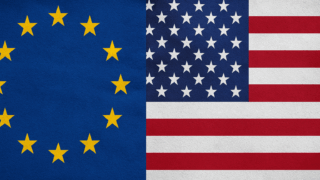
By Stefan J. Bos, Worthy News Europe Bureau Chief
TURNBERRY, SCOTLAND (Worthy News) – In a move expected to be welcomed by anxious financial markets, the United States agreed on a framework trade deal with Europe, although less favorable than the European Union had wanted.
U.S. President Donald J. Trump announced the agreement after the EU’s executive European Commission President Ursula von der Leyen travelled to Scotland to meet him for talks.
The deal, including a 15 percent tariff on EU goods entering the U.S. and significant EU purchases of U.S. energy and military equipment, will bring welcome clarity for EU companies.
It was also aimed to overcome a spiralling row between two allies who account for almost a third of global trade.
However, European critics saw the 15 percent baseline tariff as “a poor outcome” compared to the initial European ambition of a zero-for-zero tariff deal, although it is better than the threatened 30 percent rate.
In remarks to reporters, Trump said the deal would be “great for cars” and would significantly impact agriculture.
MORE DEALS
He added that he is “looking at three or four other countries” to strike deals with, and those deals will most likely include some form of tariffs.
Commentators say Trump wants “to reorder” the global economy and reduce decades-old U.S. trade deficits. So far, Trump has secured agreements with Britain, Japan, Indonesia, and Vietnam.
However, his administration has failed to deliver on the promise of “90 deals in 90 days.”
Yet talking about the deal with the EU, the world’s largest trading bloc, called it “a good deal for everybody.”
He told the media at his golf resort in Turnberry, Scotland, “It’s going to bring us closer together… It’s a partnership in a sense.”
The EU’s chief executive, Von der Leyen, hailed it as a “huge deal,” which she admitted came after “tough negotiations.”
Copyright 1999-2026 Worthy News. This article was originally published on Worthy News and was reproduced with permission.
Latest News from Worthy News
A Christian pastor detained in Nicaragua since July 2025 has been released from prison but placed under house arrest along with five other Christian believers, Worthy News established on Thursday.
An injured Christian pastor in eastern India says recalling Bible verses gave him strength to survive hours of brutal abuse by a Hindu mob that accused him of converting Hindus to Christianity.
U.S. forces carried out five sets of precision strikes against Islamic State targets across Syria between Jan. 27 and Feb. 2, the U.S. military’s U.S. Central Command announced Wednesday.
U.S. forces carried out five sets of precision strikes against Islamic State targets across Syria between Jan. 27 and Feb. 2, the U.S. military’s U.S. Central Command announced Wednesday.
U.S. Special Envoy Steve Witkoff announced on Feb. 5 that Ukraine and Russia have agreed to exchange 314 prisoners, marking the first such swap in five months and the most tangible outcome yet from U.S.-brokered talks held in Abu Dhabi. The exchange followed multiple days of trilateral negotiations involving delegations from Washington, Kyiv, and Moscow.
The Supreme Court of the United States on Wednesday declined to take up a legal challenge to California’s newly drawn congressional map, allowing the state to proceed with district lines that effectively eliminate five Republican-held U.S. House seats.
President Donald Trump said Thursday that Iran has entered negotiations with the United States because it fears potential military action, as both sides prepare for high-stakes talks expected to take place in Oman. Speaking at the National Prayer Breakfast in Washington, Trump said Tehran “doesn’t want us to hit them,” adding that a U.S. naval fleet is in the region as pressure increases.






